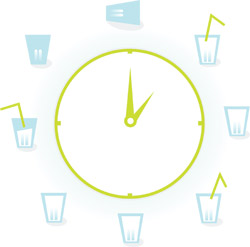
Chronic Cellular Dehydration
In medical literature, chronic cellular dehydration is typically not used to describe a condition distinct from chronic dehydration, but rather to point out the effects of chronic dehydration on an individual's cells. Thus, at least as it is widely understood, an individual who does not suffer from chronic dehydration is in no danger of suffering from chronic cellular dehydration.
But the fact of the matter is that hydration is a fundamental requirement for the functions of healthy cells. Poor hydrating habits can lead to a chronic case of cellular dehydration.
So how do you tell if you are chronically dehydrated?
Many people are and never realize it. Our bodies require at least eight glasses of water per day, more during exercise, illness, and hot weather. People often think that even if they don't actually drink water, they are getting enough by drinking coffee, tea, soft drinks, juice or beer.

The truth is that many of these beverages have a diuretic effect, encouraging the body to excrete water through urination, rather than retaining it. Think about a grape versus a raisin. The one is plump and full and juicy, containing all its natural water. The other is small, dry, shriveled, its water gone. Although a grape in dehydrated condition is still a good and useful fruit, the human body when dehydrated does not function at its best and maybe at risk for many ailments.
The body is composed of nearly 75% water, and water is required for many of its essential functions. Water is utilized as a solvent. It also provides a means to transport nutrients, hormones, and other elements. It is used to produce hydroelectric energy, especially in the brain. It is essential for maintaining cell structure. Water is also necessary to maintain a lower serum viscosity that enables proteins and enzymes to function more efficiently.
Chronic dehydration can lead to a loss or decrease in these functions and may ultimately result in disease or can exacerbate an existing condition. Contrary to popular belief, dry mouth or thirst is not the first sign of dehydration. All life began in water; even the developing fetus is surrounded by water. When the body is deprived of water, a water rationing system takes effect. Histamine, a neurotransmitter becomes active and redistributes water throughout the body.
The order of circulatory priority is the brain, lungs, liver, kidneys, and glands, then come the muscles, bones, and skin. During periods of dehydration, histamine ensures that these vital organs have enough water to function properly. If enough water is not supplied, it must be taken from within the body.
Chronic dehydration can cause histamine to become excessively active. This may result in symptoms that may be mistaken for other disorders such as allergies, asthma, dyspepsia, colitis, constipation, rheumatoid arthritis, and chronic pains in various parts of the body such as migraine headaches. Dyspeptic pain, which can range from simple heartburn to gastroesophageal reflux disorder (GERD), maybe one of the early signs of dehydration.
During the early digestive process when food enters the stomach, hydrochloric acid (HCl) is secreted to activate the enzymes to breakdown the proteins found in meat and dairy. The acidic contents of the stomach, called chyme, is then pumped into the small intestine by passing through a valve, called the pyloric sphincter. This acid chyme must be neutralized before it damages the intestinal lining.

